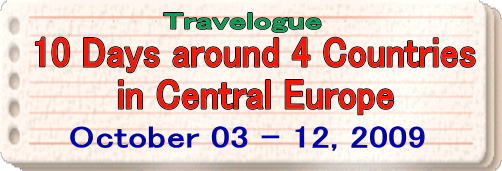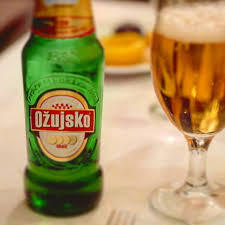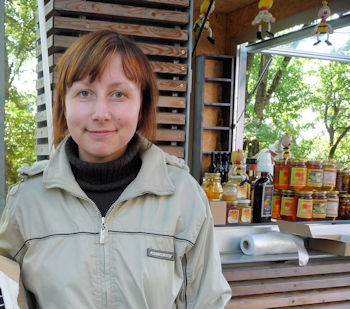|
 |
|
|
|
(S): Slovenia, (C): Croatia,
(M): Montenegro, (B): Bosnia-Herzegovina |
|
|
| 8. A la Carte 2 |
|
| Beer |
|
The beer I tasted both in the planes to and fro and at Frankfurt Airport
was Warsteiner. It is said to be another famous German beer compared with
Beck's, but for me a new brand.
 Other beers were Union in Slovenia, and Ozujsko and Karlovascko in Croatia.
Mr S, an attendant, recommended Ozujsko. Other beers were Union in Slovenia, and Ozujsko and Karlovascko in Croatia.
Mr S, an attendant, recommended Ozujsko.
To my regret, every beer was the same taste to me, while feeling richer flavor than Japanese ones. I guess all of them during the travel were "pilsner" compared with mostly "lager" in Japan.
The price anywhere was about the same with mineral water, cheaper than
juice.
I don't like to drink alcohol in the daytime, but as for this travel I
lifted the ban. |
|
| I tasted Ballantine's 12-year-old bought at Narita Airport as a nightcap
on the way with dried squid and peanuts from home as light snack, and Ozujsko
bought at a store in some rest area. |
|
| Listening to my iPod |
|
|
Our couple joined in the tour around the UK five years ago. When I was
in a bus running around Scotland, my favorite iPod was playing the Symphony
No. 3 of Mendelssohn titled "Scotland" and also "Fingal's
Cave".
We are now visiting several towns and scenic spots in Slovenia, Croatia,
Bosnia-Herzegovina and Montenegro used to belong to Former Yugoslavia.
Some embarassing story here.
Needless to say, it is all owing to my personal matters that I do not know
any composer as well as famous artist in these countries.
Nevertheless as one of the classical music fans, when overseas, I would
like to listen to the music of the composers breathed such a country's
climate. I am sorry there is no music by any composer of former Yugoslavia
in my iPod of 120 giga bites, though there are many composers of the neighboring
countries such as Russia, Germany, Austria, Hungary, Czech, .....
Wait a minute. Tilting my head to myself for a moment, I took out a world
atlas from the bookshelf.
|
|
|
Strange? There is no Montenegro. No Kosovo, nor Selvia. They must have
belonged to Yugoslavia, when the atlas was published. In fact, it was published
in 1999.
I do not have any other atlas now.
Then I open the double-page of the whole world to notice what countries my favorite composers belong to.
Each of them may be one of the countries in Europe on the left side of
the atlas. This location is not so different from my expectation.
Northern Europe of Sibelius, Grieg and Nielsen. The countries of Western
Europe are west of the UK, and further east are Austria, Hungary, Czech
and Russia.
Roughly speaking, I do not know any composer in any country from the neck
part of the Balkan Peninsula down to the south even in the same Europe
as well as any country south of Russia.
The same with the other continents except the US. There happen to be two
musics in my iPod by Villa-Lobos of Brazil.
|
|
|
It is due to my lack of knowledge for the classical music not to be widened
in myself all right, but it may be related to the various situations like
geographical circumstances, tribes, religions, etc.
When I mention the classical music, it means the musics by the composers
in such limited areas anyway.
Then now, folk musics.
The piano concerto No. 5 of Saint-Saens is nicknamed as "The Egyptian",
and many folk musics in Turkey, former Persia, India, the countries in
Asia and the other continents are incorporated into the so-called classical
musics.
The same with Japan. How many folk musics of Ainu people appear in the
"Japanese melodies". Amami folk musics and Ryukyu, too.
|
|
|
Aren't there any composers of so-called classical music in other countries
than in the limited areas? I have to stop such a silly question. I accept
my very limited knowlwdge, and maybe they have not leaped towards the world
or still have not attracted the attention in the world. I imagine the handicap
hard to exceed.
What is my intention of music appreciation from now?
To be honest, I recognize my life time will be limited only to listen to
Beethoven, Mozart and Schubert. Besides, Marler, Bruckner, Chopin, Debussy,
Liszt, Shostakovich, ..... Now further way to me.
I have to accept the inconsistency between my words and my actions for
the time being.
|
|
| War and Peace |
|
It was the day, October 9, when we went on a hike in the Plitvice Lakes
National Park. The report that the US President Barak Obama was nominated
to Nobel Peace Prize was informed of all over the world, and I could notice
it at once on TV at the corner of Croatia.
President Obama made an acceptance statement the next day, and then the pros and cons of the leaders of various countries were reported. I honestly felt that he made a very serious decision and maybe carried a heavy cross.
In between this news, the victims by the conflicts and terrorism in Afghanistan,
Pakistan and Iraq came out one after another. |
|
|
芳香に吸いよせられて蜂の群れ
Attracted by fragrance a swarm of bees
This is my haiku poem.
Honeys were lined in a stall in front of Postojina Cave, Slovenia. So various
up to pine honey. The lady staff was not too positive to sell. She recommended
to taste some to me and answered my English friendly. I bought the honey
of linden.

|
|
|
The great natural scenery, the historical heritages, and the people of
sincere friendship. A lot of tourists from all over the world will visit
here within several years. However, it is on condition that peace will
be maintained.
The traces of strife and bloodshed appear in most of the towns. They are
houses and buildings collapsed, improvised or renewed, and bullet holes
on the walls. Originally fresh and idyllic scenery is now weeping, saying
"Life, happiness and everything were taken away."
Though I have not forgotten the Hiroshima and Nagasaki disasters 64 years
ago, does the importance of peace become my blood and flesh? Haven't I
taken the peace for granted?
Who received happiness from any conflict? Who won? Tribes, religions, thoughts,
power, ..... Is a war inborn nature of mankind?
The religions created for peace often fight each other and tries to drive
mankind to ruin.
"The incurable" is human nature. "Why did I create such
a thing?", likening God lamenting it to the imperial standard, mankind
is now rushing to fall down into the bottomless ravine.
-----
I have just remembered the movie "Chaos" and "Throne of
Blood" directed by Akira Kurosawa.
|
|
|
The repeated conflicts terribly destroyed the climates with innumerable
human lives, and also the culture and art rooted in these areas. My travel
this time has reminded me of such a thing.
Noticing the various concerts on a bulletin board at Dubrovnik, I felt
some happiness in the mild wind of art.
|
|
|
|
|
|
Though I have no confidence to say that culture can only be brought up
by peace, I also do not think any art once destroyed can be brought back
to original life.
The blue sky of Mediterranean climate looked to be with tears.
|
|
| Small Local Words |
|
|
We traveled around the four countries in Eastern Europe in autumn six years
ago like this time.
Berlin and Vienna aside, when stopped by at Prague and Cesky-Krumlov of
Czech and Budapest of Hungary, I was blessed talking to local people in
a simple local words just learned. According to my travelogue at that time,
"How I wish to talk to local people in local words! This is after
all an impossible dream, but the borrowing greeting words were unexpectedly
helpful. "
|
|
The greeting words were useful this time, too.
I was in such a level as "Good morning", "How are you?" and "Thank you", but by good fortune each of the words came out naturally as time went by. It would have been the best if it had become the motive for the friendly talk, but actually only the exchange of smile afterward.
However, even the simple greeting made a substantial contribution for the
acceptance of picture taking of the local people. Most of them responded
to me with a smile. |
|
|
|
|
| Other snapshots of encounters |
|
| Local words expected to be some help |
|
Japanese
Pronunciation |
Slovenian
Pronunciation |
Croatian
Pronunciation |
| おはよう |
ドブレーラーノ |
ドブロユートロ |
| こんにちは |
ドーブルダン |
ドバルダン |
| こんばんは |
ドブリーヴェチェル |
ドブロヴェーチェ |
| おやすみ |
ラフコノチ |
ラクノチ |
| やあ/じゃあね |
|
ボーク/チャオ |
| ありがとう |
フヴァーラ |
フヴァラ |
| いいえ、結構です |
ニエジャクイエム |
ネ・フヴァラ |
どういたしまして
すみませんが |
プロシーム |
モーリム |
| ごめんなさい |
プレパーチテ |
オプロスティ
パルドン |
| さようなら |
ナスヴィデニェ |
ドヴィジェーニャ |
| はい/いいえ |
アーノ/ニエ |
ダ/ネ |
| はじめまして |
|
ドラゴミイェ |
| いくらですか? |
コリコスタネ? |
コリコストイ? |
| これをください |
ダイテミト |
ダイテミオヴォ |
|
|
| Outline of the Four Countries |
|
|
We toured around the four countries in Balkan Peninsula for 10 days in
a hurry.
This peninsula in southeastern Europe faces the Black Sea and the Aegean
Sea to the east, the Mediterranean Sea to the south, and the Adriatic Sea
and the Ionian Sea to the west. To the north, Danube and Saba Rivers are
running across.
The countries in this peninsula other than the four countries are Macedonia, Serbia, Albania, Greece, Romania, Bulgaria, and Turkey north of the Marmara Sea.
The four countries, as well as Macedonia and Serbia, belonged to former
Yugoslavia before the year of 1991. They were the base of the conflict
known well in the world. Even the views of each place we saw still retained
horrible scenes vividly.
|
|
| Pictures at Each Place |
|
|
|
| October 4 |
|
Lake Bled, Slovenia |
|
|
Postojina Cave, Slovenia |
| October 5 |
|
Zadar, Croatia |
| October 6 |
|
Split, Croatia |
|
|
Trogir, Croatia |
| October 7 |
|
Dubrovnik, Croatia |
|
|
Kotor, Montenegro |
| October 8 |
|
Mostar, Bosnia-Herzegovina |
| October 9 |
|
Plitvice Lakes, Croatia |
| October 10 |
|
Ljubljana, Slovenia |
|
|
|
|
|
The following is a table of the present situations of these four countries.
|
|
| Republika Slovenija (Slovenia) |
|
| Area: 20,256 square km (about the same with Shikoku |
|
| Population: 2,020 thousand (as of 2007) |
|
| Capital: Ljublijana |
|
| Ethnic Groups: Slovenian (90%), Hungarian, Italian, and others |
|
| Rligions: Roman Catholic (95%) |
|
| Official Language: Slovenian |
|
| Currency: Euro since 2007, EU from 2004 |
|
|
|
| Republika Hrvatska (Croatia) |
|
| Area: 56,542 square km (1.5 times as large as Kyushu) |
|
| Population: about 4,500 thousand |
|
| Capital: Zagreb |
|
| Ethnic Groups: Croats (90.42%), Serts (4.36%), others (5.22%) |
|
| Religions: Christians (91.06%), Irreligious (4.57%), Muslims (1.47%), others
(2.90%) |
|
| Official Language: Croatian |
|
| Currency: Croatian Kuna |
|
|
|
| Bosnia-Herzegovina |
|
| Area: 51,126 square km |
|
| Population: About 4,500 thousand |
|
| Capital: Sarajevo |
|
| Ethnic Groups and Religions: Muslim (44%), Selvian (31%), Croatian (Catholic
(17%) |
|
| Official Language: Bosnian, Selvian and Croatian. They have a little difference
of dialects. |
|
| Currency: コンベルティビルナ・マルカ (KM) |
|
|
| Republika Crna Gora (Montenegro) |
|
| Area: 13,812 square km |
|
| Population: 620 thousand |
|
| Capital: Podgorica |
|
| Ethnic Group: Montenegro (40%), Selvian (30%), Muslim (9%), Albanian (7%) |
|
| Religion: Selvian Orthodox (70%), Islam, Roman Catholic |
|
| Official Language: Montenegro (Almost the same with Selvian) |
|
| Currency: Euro (Not an EU country) |
|
|
Boltage is 220 v and consent is C-type plug
in all four countries. |
|
|
|
|
|
|
|
(S): Slovenia, (C): Croatia,
(M): Montenegro, (B): Bosnia-Herzegovina |
|
|
|
|
|
|
|
|
| Close |
|
|